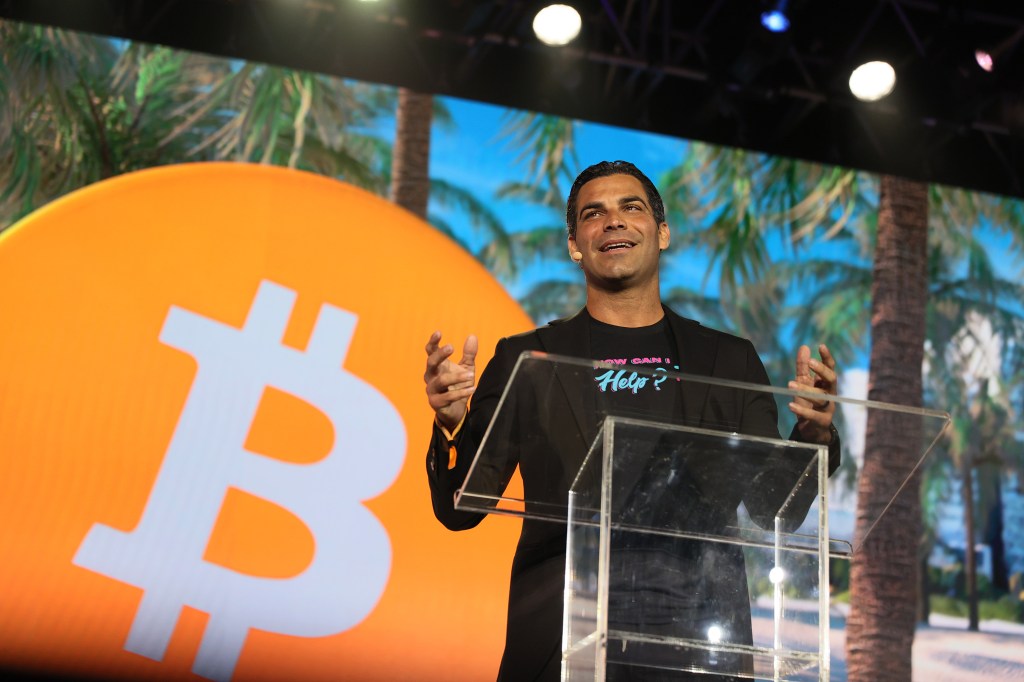In a Thursday interview with CoinDeskTV, Miami Mayor Francis Suarez revealed the city’s cryptocurrency has earned $21 million in three months. Suarez also shared that the city would be giving a “Bitcoin yield as a dividend” to residents by working with cryptocurrency exchanges to distribute digital wallets.
The interview comes after New York City Mayor Eric Adams declared a “friendly competition” between the two cities as he intends to turn the Big Apple into the hub of all things crypto through as-of-yet announced policies and initiatives. The moves come as the U.S. is turning into a global hub for the cryptocurrency industry after crackdowns in China, with many mining firms setting up shop in deregulated and energy-abundant Texas, for example. At the same time, politicians on all levels are making overtures to the emerging industry even as Congress seeks to capture billions in tax revenue from it with new laws.
Videos by VICE
“When China shuts down Bitcoin mining or Bitcoin generally, that’s a huge strategic opportunity for the United States and that’s something that we as cities should all partake in,” Suarez told CoinDeskTV. “But I think there’s also this friendly rivalry between cities to be the first Web 3.0 city.”
It’s not clear what it means to be a “Web 3.0 city” beyond some vague notion of putting everything on a blockchain. Suarez floated ideas including nuclear-powered bitcoin mining and becoming a tax-free city that covers its costs with Bitcoin as being part of the package.
Either way, if the Web3 city is anything like previous buzzword descriptors applied to cities, such as “smart” cities, it will likely herald a wave of privatization—sorry, I mean digitization—of various parts of the municipality as well as subsidies or incentives thrown at companies to settle in Miami. That seems to be the trajectory thus far.
“We have attracted major exchanges like Blockchain.com and Etoro to have headquarters in Miami. We got a major sponsorship from FTX which paid $200 million for the naming rights for the county’s arena,” Suarex added. “And of course we got the bitcoin conference—which is the largest bitcoin conference in the world—to move from LA to Miami.”
Suarez also boasted that Miami has been intent on becoming not just a hub of bitcoin but of mining and has been working with energy providers to provide cheap energy for miners, including nuclear. “We’re trying to create a comprehensive bitcoin and crypto ecosystem so that we can grab the mantle of the most crypto-friendly city in the U.S,” the mayor added.
MiamiCoin’s price is sitting just at 0.02 cents, up early 14 percent on Thursday after Suarez’s comments. The way this works is that Miami cooperates with CityCoins, a nonprofit offering an open-source protocol called Stacks (STX). This protocol allows users to trade or hoard tokens representing some portion of their city. Anybody can “mine” MiamiCoin by first obtaining STX tokens, and then sending them to a smart contract that generates MiamiCoins and sends 30 percent of the STX to the city’s wallet and 70 percent to user’s who’ve decided to lock up (or “stack”) their MiamiCoin for a yield in STX.
Stacks is built on top of Bitcoin, and so STX holders can also stack their STX tokens on that underlying protocol, and earn bitcoins. According to Suarez, this is exactly what the city intends to do, distributing the Bitcoin yield to citizens.
While that sounds a bit like a guaranteed minimum income, the devil may be in the details with who actually gets access to this system, if it materializes. Mayor Suarez said it may be taxpayers who get access to the dividend, or people with a Miami address. Both of those criteria can still leave out those without proper documentation (e.g. migrants and homeless people). Suarez also mentioned he’s working with a mentorship program called 5000 Role Models as a pilot to distribute bitcoins.
Suarez’s interview is fairly wild and envisions the possibility of eliminating taxes for residents completely as Bitcoin, CityCoin, and other cryptocurrencies as he spearheads greater adoption of digital tokens as a means of payment and compensation in the city. Surprisingly, Suarez has struggled with hs quest to widely adopt cryptocurrency as there are basic legal and practical hurdles to paying employees in Bitcoin or accepting it as taxes






